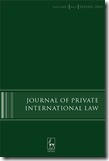Rome II: a Critical Appraisal of the Conflict Rule on Culpa In Contrahendo
Prof. Rafael Arenas Garcia (Universitat Autònoma de Barcelona and Àrea de Dret Internacional Privat blog) has written an interesting article on the controversial issue of the law applicable to culpa in contrahendo, discussing the conflict rule set out in Art. 12 of the Rome II regulation: “La regulación de la responsabilidad precontractual en el Reglamento Roma II”.
The article (in Spanish) will be published in the forthcoming issue (2007) of the Anuario Español de Derecho Internacional Privado (Spanish Yearbook of Private International Law – AEDIPr.), but it can be downloaded as a .pdf file from the Àrea de Dret Internacional Privat blog.
The English abstract reads as follows:
Article 12 of Rome II Regulation governs the obligations arising out of dealings prior to the conclusion of a contract. It establishes that the law applicable to these obligations shall be the law applicable to the contract. Where it is not possible to determine such law, the second paragraph of article 12 establishes the application of the general connecting factors of Rome II Regulation. It is also possible to choose the law applicable to culpa in contrahendo.
These solutions are not problem-free. The application of the law governing the future contract is not suitable in order to forbid the breaking of negotiations, without giving to the parties the possibility to rely on the law of the country in which the party has its habitual residence to establish that he can broke off negotiations without liability. It can also be criticized that there is no provision about the cases in which a contract between the parties has been concluded in order to rule the negotiations. As a result of this lack of provision in these cases the law governing culpa in contrahendo will be the law of the future contract instead of the law of the contract that rules the negotiations.
This article analyses these problems and the difficult delimitation between contractual and non-contractual fields in matters relating to obligations arising out of dealings prior to the conclusion of a contract. It also includes de lege ferenda proposals.
 The contributions presented at the
The contributions presented at the 